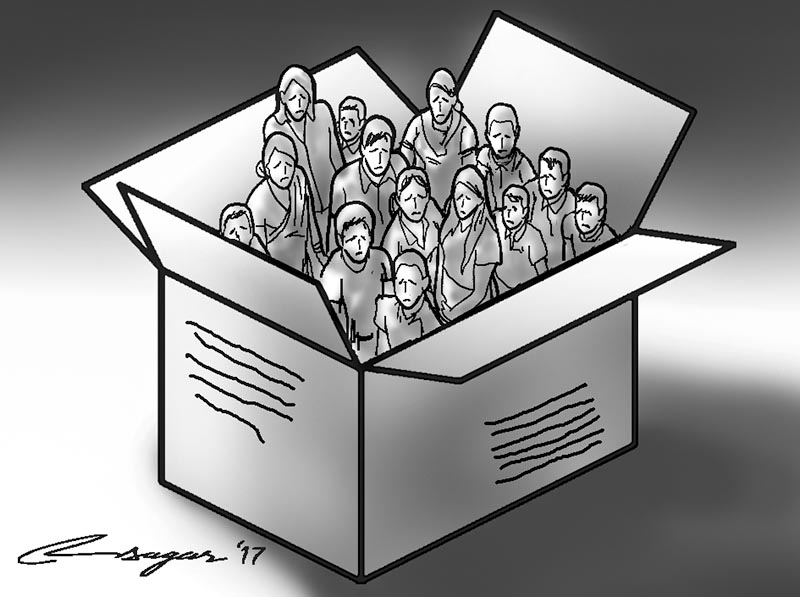Countering human trafficking: Importance of coordinated effort
If Nepal wants to see more benefits of international cooperation, including better treatment of its citizens during repatriation, and be recognized as a country committed to rooting out trafficking, ratifying Palermo is crucial
“The first duty of government is to protect its citizens.” As the United States considered legislation to mend a country recovering from our own civil war, Congressman John Farnsworth–a former Union General all too familiar with man’s potential for inhumanity to man –said these words on the floor of the Unites States Congress. This sentiment remains true for all nations, and as Nepal seeks to protect its citizens from the inhumanity of the scourge of human trafficking, the U.S. remains a partner in helping it achieve that goal.
Human trafficking takes a number of forms, including commercial sex trafficking, organ trafficking and labor trafficking, but all types of human trafficking have elements in common. They rely on exploitation of the most vulnerable. They rely on deception. They rob human beings of their dignity. All forms of trafficking should be countered with the full spectrum of tools that work to prevent them, to protect and rehabilitate victims, and to punish offenders, especially those at the top of criminal trafficking networks.
The bad news is that many Nepalis are vulnerable to trafficking due to economic hardship. As they look for job opportunities to bring themselves and their families out of poverty, people may find themselves tricked into dangerous jobs by unscrupulous employment agencies or incurring large debts that hold them hostage to abusive employers. Challenges in achieving the intent of the low-cost migration policy and the complicity of some in the financial exploitation of prospective migrants further compounds the issue, as some Nepalis are unable to rely on formal mechanisms to keep them safe.
The good news is that political will to combat some forms of trafficking is expanding, laws exist in Nepal to address human trafficking, and Nepal is in the process of building its capacity to confront the problem. For example, the government is currently working to improve existing legislation, and training investigators, prosecutors and judges to address an increasingly sophisticated criminal trade. The United States, too, is challenged with cases of human trafficking, and we work closely with Nepal to share our experiences and enable the country to dramatically decrease this scourge. Global best practices show that the greatest impact comes from a coordinated effort aimed at prevention, protection, and prosecution to counter human trafficking.
The first tier of efforts focus on preventing trafficking before it happens. Education can decrease the risk of human trafficking and help people find employment, while raising awareness of the risks of trafficking among vulnerable populations. Effective education must also inform young people, school teachers, community leaders and parents about traffickers’ deceptive practices and how to detect them.
The second tier of efforts focus on the protection of victims, who are often ostracized from their communities and may suffer from health problems – both mental and physical – stemming from their experience. Fortunately, Nepal has NGOs that provide social services and understand the unique needs that trafficking victims face. To ensure victims can access these social services as soon as possible and provide evidence helpful to convict traffickers in court, we urge the Nepal police and prosecutors to redouble efforts to identify victims proactively and improve mechanisms for referring them to support services. Similarly, authorities at the Department of Foreign Employment should be trained to recognize signs of labor trafficking and refer cases to the police and NGOs in addition to taking internal action under the Foreign Employment Act. Though victims’ suffering can never be undone, the government can provide the resources and opportunities to re-integrate them into society.
The third tier of efforts focus on prosecution of offenders, especially high-level criminals who organize trafficking networks. The threat of prison is a tremendous deterrent to labor traffickers sending Nepalis abroad on the false promise of employment, only to sell them into slavery. To help Nepal improve its prosecution efforts, the U.S. Government is training the Nepal Police and prosecutors in modern investigative techniques to convince low-level criminals to cooperate in investigations against those most responsible for trafficking networks.
I applaud Nepal for steps government and civil society have and are taking to address trafficking. The United States will continue to assist in these efforts. Now is the time for Nepal to tangibly demonstrate its full commitment to combating trafficking. Nepal has been moving forward toward ratifying the Palermo Protocols that supplement the United Nations Convention against Transnational Organized Crime. By ratifying the Protocol on Trafficking in Persons and the Protocol on the Smuggling of Migrants, Nepal would join the majority of the nations of the world – including India, Afghanistan, Sri Lanka, and Maldives – which have committed on a national level to a comprehensive commitment to counter human trafficking. If Nepal wants to see benefits of international cooperation, including better treatment of its citizens during repatriation, and be recognized as a country committed to rooting out trafficking, ratifying Palermo is a crucial step.
As we mark the World Day Against Trafficking in Persons this Sunday, I ask all Nepalis to join me in calling on the Government of Nepal to take this next step and ratify the Palermo Protocol.
Teplitz is the US Ambassador to Nepal






